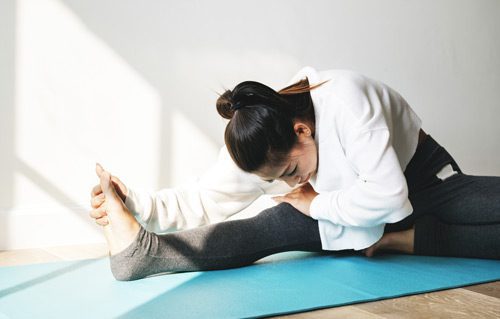When a person is addicted to drugs or alcohol, changes take place in their brain. Neural pathways related to regulating emotions, feeling pleasure, controlling impulses, and making good decisions are negatively impacted. In recovery, the brain’s circuitry and chemistry can rebuild themselves over time. Yoga contributes to this healing process by prompting the brain to release chemicals that lower anxiety levels and allowing typically active parts of the brain to rest.
What Is Gentle Yoga?
Gentle yoga, sometimes called restorative yoga, is a practice that is intended to be non-strenuous, quiet, meditative, and easier than other forms of yoga. The practitioner eases their body into non-taxing postures. As they relax into a posture, their body and mind can focus and settle into calmness.
According to an article in Gaia, practicing gentle yoga helps a person in recovery realize that they were taking their body for granted. Someone practicing gentle yoga takes time to feel their breath and their body’s movement. The attention to the breath helps to clear the mind, nurturing the body’s cells and allowing the brain and body to rebuild.
The Benefits of Gentle Yoga in Addiction Recovery
Practicing yoga gives those in addiction recovery a healthier alternative to their old way of living. They no longer turn to their substance of choice as a way of coping or escaping. Instead, they can use yoga as a coping mechanism. It can help them learn to calm themselves while improving their physical and mental health.
Gentle yoga has numerous benefits for those in recovery from drugs or alcohol addiction.
1. Cultivating Mindfulness
As the gentle yoga practitioner moves through the poses, they pay attention to the moment. They become aware of their breathing and body movements, and the mind has less tendency to wander. In this way, yoga cultivates the important practice of mindfulness.
2. Increasing Mind-Body Awareness
As the practitioner moves slowly through the range of postures, they become aware of the feelings in each joint and muscle. Gentle yoga moves slowly, providing the time needed to feel each breath and body movement, increasing mind-body awareness. As you learn to listen to your body, you gain greater appreciation and respect for it.
3. Regulating Stress Hormones
Gentle yoga is very effective at regulating cortisol and adrenaline, two stress hormones. When these hormones are not balanced, they can contribute to several mental health conditions, such as:
- Substance abuse
- Anxiety
- Depression
- Panic disorder
- PTSD
When these hormones become elevated, they create a toxic environment in the central nervous system. Yoga helps relieve tension by balancing or reducing the amount of stress hormones.
4. Reducing Stress and Anxiety
Practicing gentle yoga activates a part of your autonomic nervous system called the parasympathetic nervous system. That means your blood pressure lowers and your heart rate decreases, leading to a diminished feeling of anxiety and an enhanced feeling of calm. As the parasympathetic nervous system stays active, you will feel relaxed, calm, and peaceful. Gentle yoga creates a space for your mind to reset from negativity and your body to restore and rebalance itself.
5. Several additional benefits
People who practice gentle yoga generally have an improved self-image, increased self-awareness, and a higher level of self-confidence. There is a reduction in feelings of fatigue and an increase in energy levels. Their strength and physical stamina increase. They sleep better and typically have an overall improvement in their health and wellness.
Do You Need Help?
If you or a loved one is struggling with an addiction to alcohol or drugs, help is available. You are not alone. Call Canyon Vista Recovery Center, located in Mesa, Arizona. Our caring professionals use a combination of clinical, psychiatric, medical, and holistic therapies to help you restore balance and begin your journey to recovery.










